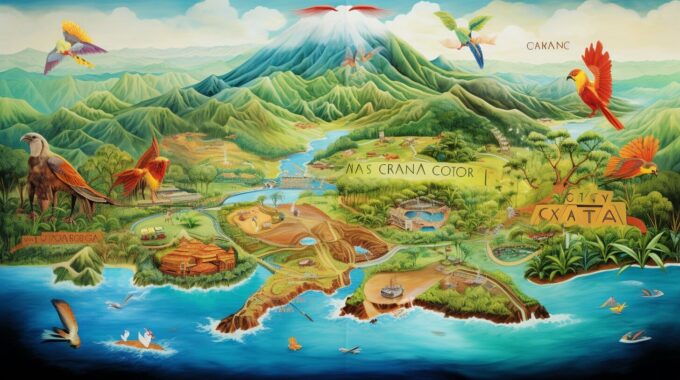At the forefront of property financing in Costa Rica, GapInvestments.com stands as a beacon for…

Exploring Costa Rica Visa Categories: A Comprehensive Guide
Costa Rica offers a variety of visa categories for visitors and immigrants, each with its own set of requirements and benefits. Whether you’re planning a short-term visit or considering a more permanent move, understanding the visa options available is crucial. This comprehensive guide will provide you with valuable insights into the visa categories, requirements, application processes, fees, and more in Costa Rica.
Key Takeaways:
- Costa Rica offers a range of visa categories for visitors and immigrants.
- Each visa category has its own specific requirements and benefits.
- Understanding the visa application process is essential for a smooth experience.
- Be prepared to submit the necessary documentation and potentially undergo medical checkups and interviews.
- Residency and citizenship are separate processes, with citizenship granting more privileges and benefits.
Costa Rica Visa Types and Residency Options
Whether you are planning a short visit or considering a long-term stay in Costa Rica, it is important to understand the various visa types and residency options available to you. Costa Rica offers a range of visas, each with its own requirements and duration of stay. The most common visa types include:
- Costa Rica Tourist Visa: This visa allows individuals to enter Costa Rica for tourism purposes. It typically has a maximum duration of 90 days and requires a valid passport, proof of a return ticket, and proof of sufficient funds for the stay.
- Costa Rica Work Visa: If you plan to work in Costa Rica, you will need a work visa. This visa requires a job offer from a Costa Rican employer, proof of qualifications or experience in the relevant field, and a clear criminal record.
- Costa Rica Student Visa: Students who wish to study in Costa Rica can apply for a student visa. This visa requires proof of enrollment in a recognized educational institution in Costa Rica and sufficient funds to cover tuition and living expenses.
- Costa Rica Residency Visa: For those considering long-term residency in Costa Rica, there are several residency options available. These include the pensionado visa for retirees, the investor visa for those making significant investments in Costa Rica, and the rentista visa for individuals with a guaranteed fixed income.
Each visa type has its own specific requirements, documentation, and application process. It is important to carefully review the requirements and consult with immigration experts like CRIE to ensure a smooth and successful application process.
Residency vs. Citizenship
It is essential to understand the distinction between residency and citizenship in Costa Rica. Residency grants individuals the right to live and work in Costa Rica for an extended period, while citizenship offers additional privileges and benefits. To become a citizen of Costa Rica, one must fulfill specific requirements, including legal residency, passing a Spanish language exam, having a clean criminal record, and demonstrating good conduct.
Dual citizenship is not allowed in Costa Rica, so individuals seeking citizenship must renounce their previous citizenship. It is recommended to seek expert guidance and support from immigration professionals like CRIE to navigate through the complexities of the residency and citizenship process in Costa Rica.
Understanding the various visa types and residency options is crucial when planning a stay or relocation to Costa Rica. By familiarizing yourself with the requirements and seeking professional assistance, you can ensure a smooth and successful immigration journey. CRIE, Costa Rica’s leading immigration firm, is here to provide personalized support and guidance, ensuring you have all the necessary information and documentation for a seamless experience.
| Visa Type | Requirements |
|---|---|
| Tourist Visa | Valid passport, return ticket, proof of funds |
| Work Visa | Job offer, qualifications, clean criminal record |
| Student Visa | Enrollment proof, sufficient funds |
| Residency Visa | Specific requirements based on visa type |
Conclusion
Navigating the Costa Rica visa and residency process can be complex, but with the support and expertise of immigration professionals like CRIE, you can ensure a seamless and stress-free experience.
When considering a move to Costa Rica, it is essential to understand the various types of visas and residency options available. Costa Rica offers different categories, such as tourist visas, work visas, student visas, as well as residency options like pensionado, investor, and rentista.
Each visa and residency category has specific requirements and benefits. Tourist visas, for example, allow individuals to stay in the country for a limited duration, while work visas require sponsorship from a Costa Rican employer. Residency options provide long-term stays and offer additional advantages based on individual circumstances.
The immigration process in Costa Rica involves submitting the necessary documentation, which may include medical checkups and interviews. It is crucial to understand the distinctions between residency and citizenship, as citizenship offers more privileges and benefits. To become a citizen, one must meet specific requirements, including legal residency, passing a Spanish language exam, having a clean criminal record, and demonstrating good conduct. Dual citizenship is not permitted in Costa Rica.
To ensure a smooth journey through the visa and residency process, it is recommended to work with immigration experts like CRIE. Their personalized support and guidance can assist in navigating the requirements, understanding the application process, and handling any challenges that may arise. With their expertise, you can save time, avoid unnecessary stress, and increase your chances of a successful immigration, residency, and citizenship experience in Costa Rica.
FAQ
Q: What are the immigration requirements for moving to Costa Rica?
A: Moving to Costa Rica requires meeting specific immigration requirements, including understanding the different types of visas and residency options available, and providing the necessary documentation.
Q: What types of visas are available in Costa Rica?
A: Costa Rica offers various visas, including tourist, work, and student visas, each with its own requirements and duration of stay.
Q: What are the different residency options in Costa Rica?
A: There are different residency options in Costa Rica, such as pensionado, investor, and rentista, each with specific requirements and benefits.
Q: What is the immigration process like?
A: The immigration process involves submitting the required documentation and may include medical checkups and interviews.
Q: What is the difference between residency and citizenship in Costa Rica?
A: Residency grants the right to live and work in Costa Rica, while citizenship grants more privileges and benefits. Becoming a citizen in Costa Rica requires meeting specific requirements, including legal residency, passing a Spanish language exam, having a clean criminal record, and demonstrating good conduct.
Q: Can I have dual citizenship in Costa Rica?
A: No, dual citizenship is not allowed in Costa Rica.
Q: How can immigration experts help with the process?
A: It is recommended to work with immigration experts like CRIE for personalized support and guidance throughout the immigration, residency, and citizenship process in Costa Rica.


